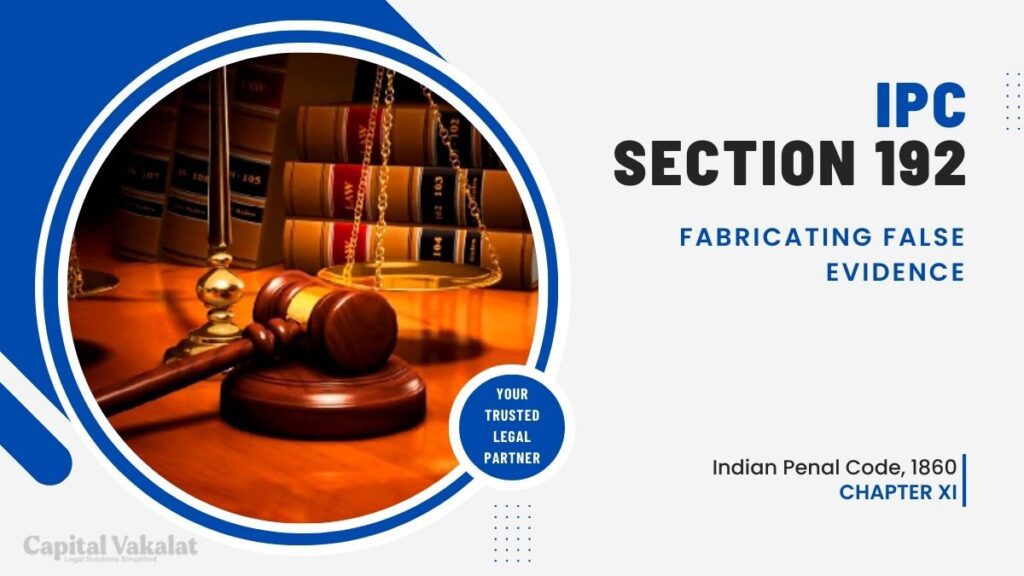In the world of law and justice, truth is paramount. Fabricating false evidence is a serious offense that undermines the very essence of justice and the rule of law. Section 192 of the Indian Penal Code (IPC) deals with the act of fabricating or providing false evidence with the intent to influence the outcome of legal proceedings.

In this article, we will delve into the intricacies of Section 192 IPC, exploring the legal implications, real-life examples, penalties, and the importance of maintaining the integrity of evidence in the legal system.
Understanding the Concept of Fabricating False Evidence
Fabricating false evidence essentially means creating or presenting information, documents, or testimonies that are untrue, with the intention of deceiving the court, law enforcement, or any other legal authority. This can occur in various forms, such as forging documents, providing false alibis, or even manipulating digital evidence in today’s digital age.
The Legal Perspective on Fabricating False Evidence
Section 192 IPC Explained
Section 192 of the IPC specifically addresses the act of fabricating false evidence. It states that whoever causes any circumstance to exist or makes false documents with the intent to cause any false evidence to be given in any stage of a judicial proceeding shall be punished under this section.
Key Elements of the Offense
To be convicted under Section 192 IPC, the following elements must be established:
- The accused caused a circumstance to exist or created false documents.
- The intention was to cause false evidence to be given in a judicial proceeding.
Penalties and Punishments
Individuals found guilty of fabricating false evidence can face significant penalties. The severity of the punishment depends on various factors, including the nature of the case and the consequences of the false evidence. Penalties may include fines and imprisonment.
Real-Life Examples of Section 192 IPC Cases
To illustrate the gravity of fabricating false evidence, let’s examine a few real-life cases where this offense was committed. These cases not only highlight the impact of such actions on the justice system but also shed light on the complexities involved in proving such offenses.
Importance of Proving False Evidence Fabrication
Ensuring the integrity of evidence in legal proceedings is crucial for upholding justice. Fabrication of false evidence not only results in wrongful convictions but also erodes public trust in the legal system.
How to Report False Evidence Fabrication
If you come across or suspect the fabrication of false evidence, it is your moral and legal duty to report it. We will discuss the proper channels for reporting such cases in this section.
Legal Defenses Against False Evidence Accusations
In some cases, individuals may be wrongfully accused of fabricating false evidence. It’s important to understand the legal defenses available to protect one’s rights and reputation.
The Role of Digital Evidence in Modern Cases
In today’s digital age, evidence is increasingly stored and presented in digital formats. We will explore the challenges and opportunities presented by digital evidence in Section 192 IPC cases.
Challenges Faced by the Legal System
The legal system faces various challenges in dealing with false evidence cases, from the time-consuming investigation to ensuring fair trials. We’ll discuss these challenges and possible solutions.
Famous Cases Involving Fabrication of False Evidence
Throughout history, there have been notable cases where individuals attempted to fabricate false evidence. Some of these cases have captured the public’s attention and left a lasting impact on the legal landscape.
The Role of Forensics in Identifying False Evidence
Forensic science plays a vital role in detecting fabricated evidence. We’ll explore how forensic experts contribute to the quest for truth.
Social Implications and Consequences
Beyond the legal realm, the fabrication of false evidence has social consequences. It can lead to public distrust, and its ramifications can extend far beyond the courtroom.
Recent Developments in Section 192 IPC
As society and technology evolve, so do the challenges related to false evidence. This section will discuss recent developments and changes in the legal landscape.
Conclusion
In a world where justice and truth are paramount, Section 192 IPC stands as a vital pillar in upholding these values. Fabricating false evidence strikes at the very heart of justice, and it’s essential to understand the legal implications, penalties, and the importance of preserving the integrity of evidence in the legal system.
Ensuring that evidence is accurate and truthful is not only a matter of law but also a moral responsibility. In a world that relies on the principles of fairness and integrity, the fabricating of false evidence threatens the foundation of justice.
Remember, justice prevails when the truth is upheld and falsehoods are exposed. It is our collective duty to ensure that justice is served, and false evidence has no place in our legal system.
Frequently Asked Questions
What should I do if I suspect someone is fabricating false evidence?
If you suspect false evidence fabrication, you should report it to the relevant authorities or legal professionals.
Are there any legal safeguards against the misuse of Section 192 IPC?
Yes, there are legal defenses available to those wrongfully accused of fabricating false evidence.
How has technology impacted the fabricating of false evidence?
Technology has both challenged and aided the detection of false evidence, especially in the digital age.
What recent changes have occurred in Section 192 IPC and its enforcement?
The legal landscape is evolving, with changes to adapt to the challenges posed by modern society and technology.